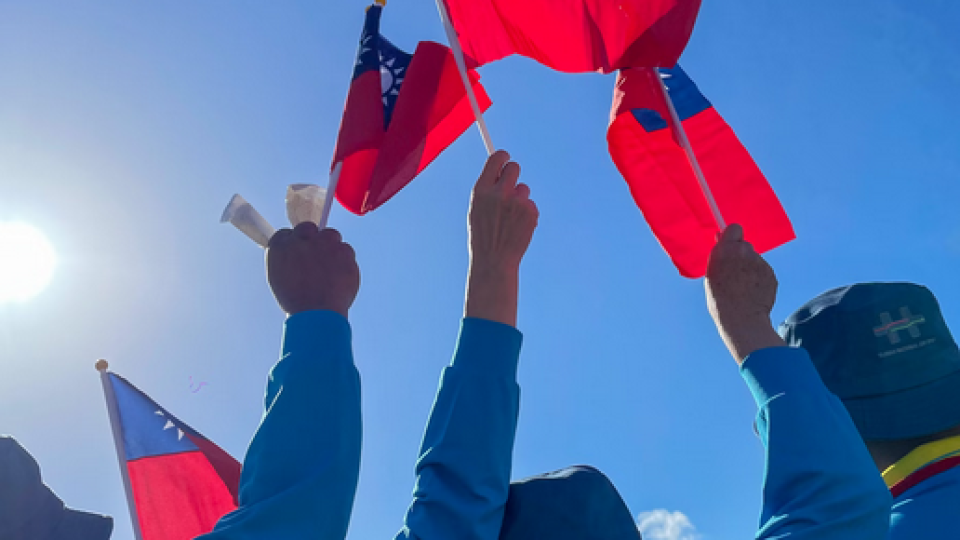January 8, 2024
TAIPEI – Taiwan’s politicians are training their firepower on “land battles”, or in-person campaigning, as this is the last weekend ahead of the Jan 13 legislative and presidential elections.
At the weekend, politicians of the major parties fanned out across the island to canvass for votes, in a shift from the online campaigns – called “air battles” – they had been waging to woo the young electorate.
On Jan 6, the ruling Democratic Progressive Party (DPP) and opposition Kuomintang (KMT) rolled out their big guns at rallies in New Taipei and Taoyuan cities.
At a rally in New Taipei City, DPP heavyweights – Taiwanese President Tsai Ing-wen, Kaohsiung Mayor Chen Chi-mai and former premier Su Tseng-chang – energised the crowd before DPP vice-presidential candidate Hsiao Bi-khim and presidential candidate Lai Ching-te made their appearances to loud cheers.
Supporters waving green and pink flags, some of whom were transported by bus to the rally held at a park in Xinzhuang district, New Taipei City, greeted Mr Lai with “Zong tong hao”, meaning “Hello, President”.
Singers earlier warmed up the 30,000-strong crowd with evergreen songs like Passionate Desert, while vendors hawked items such as green baseball-style jackets like those worn by the DPP leaders, and stickers and keychains bearing the caricatures of Mr Lai and Ms Hsiao.
At the rally, a retiree in her 60s, who gave her name only as Ms Chiang, told The Straits Times that she is supporting Mr Lai and Ms Hsiao as they love Taiwan.
“If (Mr) Hou gets elected, he will sell Taiwan away and allow Chinese students to come here and compete for jobs,” she added. She was referring to presidential candidate Hou Yu-ih of the KMT, which is more China-friendly than the independence-leaning DPP.
China regards democratically governed Taiwan as a part of its territory to be reunified with it, but most Taiwanese prefer to maintain the status quo.
Mr Lai and Ms Hsiao are considered the favourites to win the presidential election, having led their KMT and Taiwan People’s Party (TPP) rivals in most opinion polls before a blackout on the publication of such survey results kicked in on Jan 3.
In Taoyuan city, north-western Taiwan, Mr Hou and running mate Jaw Shaw-kong were joined by Taipei Mayor Chiang Wan-an, former Kaohsiung mayor Han Kuo-yu and KMT chairman Eric Chu at a rally attended by some 100,000 people.
But one big name in the KMT-led pan-Blue camp was notably missing: businessman Terry Gou, the Foxconn founder, who initially wanted to run for president but decided against it on Nomination Day.
The KMT camp has kept open an invitation for Mr Gou to unite behind its candidates to focus on unseating the DPP government.
At an earlier indoor rally in New Taipei City on Jan 6, about a dozen supporters clad in blue and red – colours associated with the KMT – literally drummed up support for the KMT candidates by striking Chinese-style drums.
Even the smaller TPP, founded in 2019 by presidential candidate Ko Wen-je and which campaigns mainly online as it lacks the resources of the bigger parties, held a rally in Taichung city on Jan 6.
There was a security scare at the event when a 32-year-old man was arrested with an air pistol, but that did not affect the TPP rally, which went on as planned and drew some 50,000 people.
KMT’s Mr Han, the former Kaohsiung mayor, used the incident to take a dig at Dr Ko, as he urged TPP supporters to transfer their vote to the KMT presidential candidates instead.
“Ko is like an air pistol – very lively, but he won’t win,” he said at the KMT rally in Taoyuan.
Besides rallies, motorcades were also part of the mix.
Dr Ko and Mr Hou travelled around the island in separate motorcades, waving to supporters who lined the streets.
On Jan 6 morning in New Taipei City’s Banqiao district, some supporters rushed forward to give Mr Hou large bunches of garlic sprouts to wish him luck in the race.
The sprouts symbolise the phrase “dong suan” heard at all campaign rallies, which is “frozen garlic” in Mandarin but sounds like “to be elected” in the Minnan dialect.
Ms Chang Si-ling, 52, waited for about 30 minutes outside a convenience store at a busy street corner before Mr Hou’s team drove by.
“I wanted to come out and show my support for him because I think it’s time for a change in government. I am scared about the possibility of war,” said the housewife, who has a 24-year-old son.
Mr Lai, too, tried to squeeze in as many places as he could, travelling to places such as Chiayi, Taichung and Taoyuan cities.
On Jan 7, all three presidential candidates made appearances in Kaohsiung in south Taiwan, a DPP stronghold.
At the TPP rally in Kaohsiung on Jan 7, which the party said was attended by 80,000 people as at 8.45pm, TPP legislative candidate Huang Kuo-chang urged supporters to send Dr Ko to the presidential office.
In response to Mr Han’s “air pistol” barb, he said TPP supporters “are no air pistols but are like grass representing Taiwan’s vitality”.

